
Richard Georg Strauss was a German composer, conductor, pianist, and violinist. Considered a leading composer of the late Romantic and early modern eras, he has been described as a successor of Richard Wagner and Franz Liszt. Along with Gustav Mahler, he represents the late flowering of German Romanticism, in which pioneering subtleties of orchestration are combined with an advanced harmonic style.

Winterreise is a song cycle for voice and piano by Franz Schubert, a setting of 24 poems by German poet Wilhelm Müller. It is the second of Schubert's two song cycles on Müller's poems, the earlier being Die schöne Müllerin.
"Der Doppelgänger" is one of the six songs from Franz Schubert's Schwanengesang that sets words by Heinrich Heine for piano and tenor voice. It was written in 1828, the year of Schubert's death.
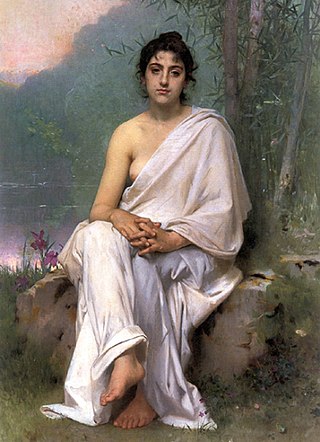
"Ruhe, meine Seele!", Op. 27, No. 1, is the first in a set of four songs composed by Richard Strauss in 1894. It was originally for voice and piano, and not orchestrated by Strauss until 1948, after he had completed one of his Four Last Songs, "Im Abendrot". The words are from a poem "Ruhe, meine Seele!" written by the poet Karl Henckell.

"Heimliche Aufforderung", Op. 27, No. 3, is one of a set of four songs composed for voice and piano by Richard Strauss in 1894. The German conductor Robert Heger orchestrated it in 1929. The text is from a poem in German by John Henry Mackay.

The Piano Sonata in B minor, Op.5, was written by Richard Strauss in 1881–82 when he was 17 years old. The Sonata is in the Romantic style of his teenage years. The first recording of the piece was the last recording made by the Canadian pianist Glenn Gould.
In 1882–3 Richard Strauss wrote his Horn Concerto No. 1 in E-flat major, Op. 11, in two versions, one for piano accompaniment and one with an orchestra. The horn concerto has become the most frequently performed horn concerto written in the 19th century.The premiere with piano accompaniment was given in 1883 at Munich. The premiere with orchestral accompaniment in 1885 at Meiningen. Strauss later wrote a second horn concerto in 1942, towards the end of his life.

"Zueignung" is a Lied composed by Richard Strauss in 1885, setting a poem by the Austrian poet Hermann von Gilm. It was included in Strauss's first published collection of songs, as Op. 10 in 1885. Originally scored for voice and piano, the song was orchestrated in 1932 by the German conductor Robert Heger and in 1940 by Strauss himself. It is one of the composer's best-known songs.
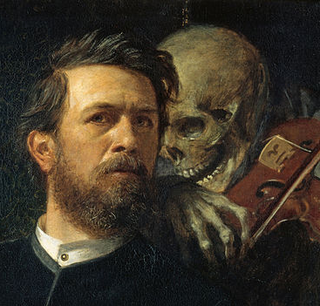
"Notturno", Opus 44, Number 1, is an orchestral song written for low voice, which Richard Strauss composed in 1899 based on a poem Erscheinung by the German poet Richard Dehmel (1863-1920). In performance it takes about 13 minutes. Norman Del Mar described it as “ranking amongst Strauss’s finest as well as more ambitious works”.

"Frühlingsfeier" is a song composed by Richard Strauss using the text of a poem with the same name by Heinrich Heine (1797-1856), the fifth in his Opus 56 collection, which was published in 1906. Originally written for piano and voice, Strauss wrote an orchestral version in 1933.
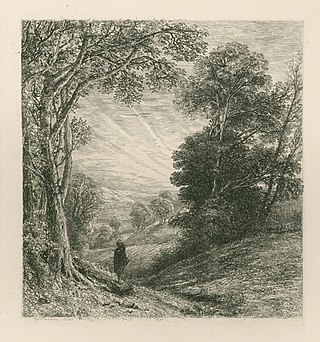
"Des Dichters Abendgang" is an art song composed by Richard Strauss using the text of a poem with the same name by Ludwig Uhland (1787–1862), the second in his Opus 47 collection, which was published in 1900. Originally written for piano and voice, Strauss wrote an orchestral version in 1918.
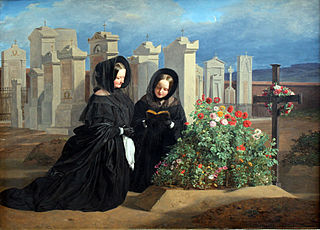
"Allerseelen" is an art song for voice and piano composed by Richard Strauss in 1885, setting a poem by the Austrian poet Hermann von Gilm from his collection Letzte Blätter. It is the last in a collection of eight songs which were all settings of Gilm poems from the same volume entitled Acht Lieder aus Letzte Blätter, the first collection of songs Strauss ever published as Op. 10 in 1885, including also "Zueignung" (Dedication) and "Die Nacht". The song was orchestrated in 1932 by German conductor Robert Heger.

"Befreit" is an art song for voice and piano composed by Richard Strauss in 1898, setting a poem by the German poet Richard Dehmel. The song is part of the collection Fünf Lieder für hohe Singstimme mit Pianofortebegleitung. Strauss orchestrated the song in 1933.

"Der Arbeitsmann" is an art song for voice and piano composed by Richard Strauss in 1889, setting a poem by the German poet Richard Dehmel. The song is part of the collection Fünf Lieder für hohe Singstimme mit Pianofortebegleitung. Strauss orchestrated the song in 1918.

"Winternacht" is an art song for voice and piano composed by Richard Strauss in 1886, setting a poem of the same title by the German poet Adolf Friedrich von Schack (1815–1894). The song is part of his collection Five songs for middle voice and piano, Op. 15, TrV 148.

"Sehnsucht" is an art song for voice and piano composed by Richard Strauss in 1896, setting a poem of the same title by the German poet Detlev von Liliencron (1844–1909). It is the second song in his collection Five songs for voice and piano, Op. 32, TrV 174.

"Ständchen" ("Serenade") is an art song composed by Richard Strauss in 1886, setting a poem of the same title by the German poet Adolf Friedrich von Schack. It is the second song in his collection Six songs for high voice and piano, Op. 17, TrV 149, which were all settings of Schack poems. The song is written for voice and piano.

Die Tageszeiten is a choral composition written for male voice choir and orchestra by Richard Strauss (1864–1949), TrV 256, Op. 76. It consists of four movements: "The Morning", "Afternoon Peace", "The Evening" and "The Night". The lyrics are based on four poems of the same names by Joseph Eichendorff (1788–1857) from his collection Wanderlieder. The work was premiered on 21 July 1928 with the Wiener Schubertbund and the Vienna Philharmonic as part of the Schubert centenary.

Taillefer, Op. 52, TrV 207, is a cantata for choir and orchestra composed by Richard Strauss in 1903. The text is a rendering of the medieval tale Taillefer by the German poet Ludwig Uhland (1787–1862). The piece was written to celebrate the centenary of Heidelberg University and was premiered on the same day that Strauss received his honorary doctorate from the university, on 26 October 1903 in the newly built Heidelberg Town Hall with Strauss conducting. It is written for a mixed chorus with three soloists, tenor (Taillefer), baritone, and soprano, with a large orchestra. The work was performed at the last night of The Proms in 2014.
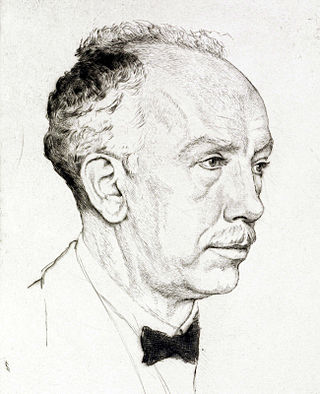
Sechs Lieder, Op. 68, is a collection of six Lieder by Richard Strauss. He composed them, setting poems by Clemens Brentano, in 1918 for soprano and piano, and orchestrated one in 1933 and five in 1940. The piano version was first published by Adolph Fürstner in Berlin in 1919. They are also known as Brentano Lieder.


















